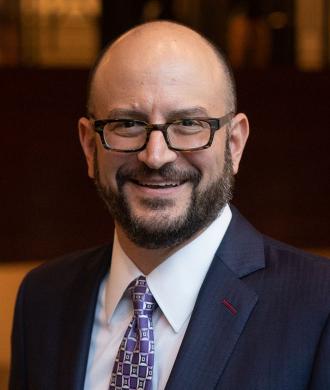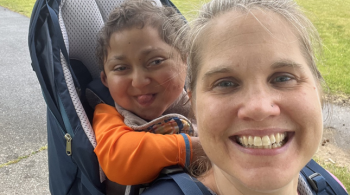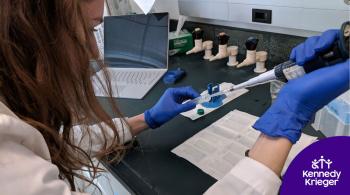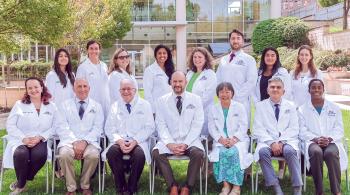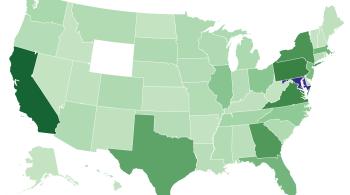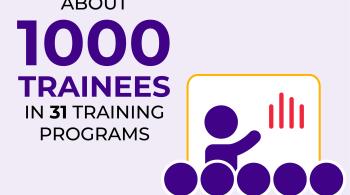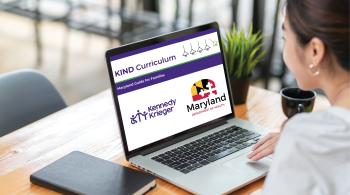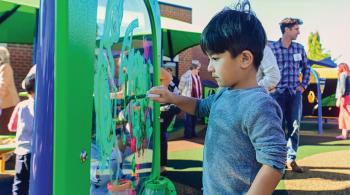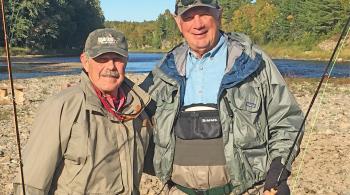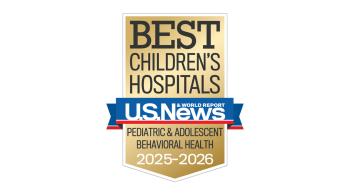Back to School – Improving the Education of Children with Neurodevelopmental Challenges
As students get ready to go back to school soon, Kennedy Krieger President and CEO Dr. Brad Schlaggar and his guest, Dr. Nancy Grasmick, former superintendent of schools for the state of Maryland, discuss educating students with neurodevelopmental concerns, the importance of training teachers to meet the needs of those students and what can be done to improve the educational outcomes of all students.
Resources
- Maryland Center for Developmental Disabilities
- Project HEAL (Health, Education, Advocacy and Law)
- Individuals with Disabilities Education Act (IDEA)
- Maryland Department of Disabilities Education 504 Plans
Learn More About Dr. Schlaggar and Dr. Grasmick
Learn More About Dr. Schlaggar and Dr. Grasmick
View Episode Transcription
Dr. Brad Schlaggar (BS): Welcome to Your Child's Brain, a podcast series produced by Kennedy Krieger Institute with Assistance from WYPR. I'm Dr. Brad Schlaggar, pediatric neurologist, and president and CEO of Kennedy Krieger Institute. It is hard to believe that we are already in August, the waning weeks of summer vacation from any students with families and educators getting ready for a new school year to begin. For parents, students and teachers, this period can be exciting, as well as a little nerve racking. For parents of children with intellectual and developmental disabilities, in particular, a new school year can bring real uncertainty, heightened anxiety, and for some fear. Common worries include concerns about summer learning loss, the ability of teachers in the school to meet their child's individualized learning needs, the child's ability to keep up with increased academic and social demands, adjustment to new environments, as well as concerns of safety, especially around potential bullying. Highly relevant context for a discussion of individualized learning needs is the very important principle in human neuroscience, that there is natural variation in how people's brains work with no single correct way. While strong commonalities across people certainly exist, each of us brings our own unique approach to thinking, to problem solving, and information processing, where information here includes sensory stimuli, language, the emotional state of others, unexpected events, and so on. That principle of natural variation or heterogeneity, commonly referred to now as neurodiversity applies to people whose development is considered typical or neurotypical, as well as those with atypical development, such as those with intellectual and developmental disabilities. The proportion of students in a classroom with a neurodevelopmental diagnosis is higher than one might expect. In one large study looking across the years 2009-2017, about one in six children ages 3-17 years met criteria for a neurodevelopmental diagnosis as reported by parents. Children with intellectual developmental or physical disabilities are at significant risk of being chronically under served in school. The Individuals with Disabilities Education Act or IDEA of 1990, along with its predecessor, the Education for All Handicapped Children Act of 1975, as well as Section 504 of the Rehabilitation Act of 1973, are the main federal laws that protect the educational rights of children with disabilities. These laws promise every child with a disability a free appropriate public education which means the provision of individualized special education and related services designed to meet the child's unique needs and must be provided in the least restrictive environment in order to meet those needs. Now, teaching a classroom of neurotypically developing children is itself challenging. Teaching students with neurodevelopmental differences as another layer of complexity to the work. However, we know that all students can learn and they and their teacher can experience success. Students with neurodevelopmental disabilities are simply put students first, and my guest today is a true champion of that perspective. I'm extremely honored to be joined by the visionary leader, Dr. Nancy Grasmick. Dr. Grasmick's pioneering leadership story began when she suffered temporary deafness as a teenager. Inspired by Helen Keller, she devoted her life's work to education. Dr. Grasmick's decades of leadership included serving as Maryland's superintendent of education 1991-2011, leading Maryland's public schools to rank number one nationally during her tenure. Dr. Grasmick is on Kennedy Krieger's Institute and Foundation Boards of Directors. As our institute board chair 2018-2024, an alumna of Towson University, she is their first presidential scholar. Welcome Nancy. I said previously during that introduction that children with neurodevelopmental disabilities learn differently, how does that impact their learning?
Dr. Nancy Grasmick (NG): It has huge impact. May I say I'm delighted to be with you today, Dr. Schlaggar, and to be able to speak to some of the issues because we have a large number of students, both in Maryland and across this country who need to be considered for some of the special knowledge that a teacher has to embrace to be able to be successful with these children. In that way, the teacher has to understand what are the different dimensions of learning that are embodied in this particular child. In most classes with children with neurodiversity, you do not have two children who are learning exactly the same way. Their needs are very different, and each of those children have to be examined, analyzed, and preparation for the content being taught has to accommodate those differences. The teacher has to have a lot of skills to be able to do that successfully. They have to have a deep knowledge of neurodiversity. They have to have a deep knowledge of some of the areas of learning, hearing, vision, all of that coming together the intellectual capacity of the child, to be able to really differentiate that learning for each individual child.
BS: It's a high burden on a given teacher to carry that out. How does it in real terms impact teaching in the classroom moment by moment, day by day?
NG: It isn't the idea of what most of us have experienced, which is the teacher comes into the room, the students arrive, and we tend to be taught as a common group. That does not work for these children. Each teacher has to have that diagnostic knowledge about each individual child. Then the teacher has to differentiate. How the information will be presented to the student and how she can assess how the student is responding and making the necessary differences so that she can elevate that child to success.
BS: How would you characterize an ideal model for teaching children with disabilities, inclusive of classroom size and access to services inside that school?
NG: The school has to be configured in a different way. That has to do with the fact that because the demand is so huge for the teacher to be successful with each of the students, it has to be a much smaller number of students, where the teacher has responsibility, often requiring the teacher to have some assistance so that for all the time the child is in that classroom, there's an adult who's knowledgeable who's interacting with that student. That's a requirement. It's like 10 different preparations that teacher has to do compared to a more typical classroom where one preparation for the class for each subject area would be satisfactory. That would never work for this group of students.
BS: I'd like to back up a bit and talk about here we are in Maryland, the educational system that you know extremely well, of course. Let's talk about how the State of Maryland works to meet the needs of students with no developmental challenges, and maybe a bit of how we got to where we are right now.
NG: Well, thank you for asking that question because I think it's so fundamental to the success we're experiencing in Maryland, and we do have a way to go. But years ago, when I first started, there were not many schools that could truly accommodate the students we're referencing today educationally. In order to fulfill our responsibility to the federal law, we had to send students out of state. That meant separation from family, little or no communication with families. It also meant that we did not have regular evaluation of how the student was progressing, and the cost was exorbitant. In presenting those cases to the general assembly, there was a desire to have children. Return to Maryland to be with their families, for families to understand how to work with them and for the cost to be not so prohibitive, and also to ensure that the quality of what the student was receiving and the outcomes were those that we could better predict. The change occurred that the General Assembly decided there would be a special contribution of funding, that the local school system and these are public school students. That when a system says, we're not going to be adequately able to educate these students, they can refer them and that they would pay close to 300% of the per pupil expenditure. But then the state would kick in the rest of the required funding because these settings were so individualized that it costs more to educate these students. But the outcomes accelerated for having students close to families, having families engaged, having ensuring the quality of the teachers to which they'd be exposed, it was almost miraculous. These are now called non-public schools, which I don't agree with the nomenclature. These are public school students where a general education program will not meet their needs. They have to be taught in a very specialized way, as we've already discussed, but it should not be called non-public because they are public school students, and we have every obligation to them that we have for every other student.
BS: Yes. I agree this. The nomenclature non-public is really non-specific and refers to a whole host of schools that may not be serving publicly funded students. We're talking now about schools, and of course, with Kennedy Krieger, we have five such schools serving just nearly 500 students, but we are not alone. There are other sources of this mechanism for serving, educating, and providing the related services necessary for publicly funded students from throughout the state. But this nomenclature is very confusing.
NG: It's inhibiting in some ways, because public schools have access to funding that these, so to speak, non-public schools do not have access to that funding. Just, for instance, the whole construction and improvement of facilities, we don't the non-public schools do not have access to that funding, and public schools do. Yet we have a large cohort of these students because we have the excellent facilities in Maryland are being referred. We have a large cohort of students who require this specialized education, but we're not having the benefits of some of the regular, I will say, typical public schools.
BS: Just to underscore, these are students that are referred to such schools as ours that are referred via the public school system. The local education authority makes that referral. Schools such as ours and others, just to be really clear about that are not tuition receiving, and parents can't simply say, I would like my child to go to this school. The student must be referred from the local school system.
NG: The student must be referred from the local school system, and then often it's reviewed at the central office of the school system. If a parent works outside of that to have a child enrolled, first of all, the facility has to accept non-public school students, and the parent would be responsible for the tuition. Under these circumstances that we've discussed, how it's been configured in Maryland, no parent pays anything to have a child go to the non-public school when it is referred by the local school system.
BS: A moment ago, you mentioned outcomes. Let's talk a bit about the benefit of improved outcomes as a consequence of this transition that was made at the state to make sure that students are educated here in Maryland. What are those improvements and outcomes that you referenced?
NG: We're so thrilled today, and I say we, because I feel like I've been part of this growth pattern since I've been in education. We're so thrilled with the idea that when we attend graduations in these non-public special education schools, and particularly at Kennedy Krieger, and I'd like to lift Kennedy Krieger up to say, we have students who matriculate with these very intense needs so successfully that they're getting a Maryland, a legitimate Maryland High School diploma. Then at Kennedy Krieger, there's the opportunity for them to move forward with skill training, etc, that would ultimately end up in there being able to secure work positions. The quality of the instruction that's given and the understanding of that particular child's needs and how that's accommodated ends up being such an asset in the sense of these children not leaving school and sitting watching television or listening to records. These children are being prepared for positions in life.
BS: Let's return to the approach to teacher training for children with neurodevelopmental disabilities. In our current milieu, locally, nationally, what do you see are the limitations with our current teacher training for teaching children with disabilities?
NG: We're fortunate in the state of Maryland to have a number of institutions of higher Ed where they are attempting to offer opportunities for training for teachers. The first huge problem is that people recognize this is a profession that requires a lot of dedication and knowledge, and people are choosing not to go into it. I don't think we have the publicity that's necessary to present how rewarding this profession can be. That's problem number one. Number two, we are thinking here at Kennedy Krieger about how do we provide the best preparation possible for potential teachers. Because we've been successful over the years, we want to collect that kind of data. We want to really cleanse it in every possible way to ensure that it's excellent and to be able to disseminate it. I believe that the intent is good in institutions of higher Ed, but I also believe it is not current. It is not on the cutting edge. We've learned so much medically, as well as educationally, that it isn't on the cutting edge. That can be discouraging to a person who matriculates through the program comes to do the teaching, but feels inadequate. We are doing one other thing that I think is helpful, and that's pre-service teaching. When a person accepts a position at Kennedy, they're coming into an opportunity for pre-service before they ever enter the classroom. But we have to do more, and that's why I'm calling it the research school that we're thinking about could have incredible implications for excellence in this field. I think more people would be attracted, feeling that they'll be successful because they've had this excellence of training.
BS: You have a vision, Nancy, of how we can improve education through either demonstrably proven approaches or working towards making sure that the approaches are evidence driven. Expound some more, if you will, on that vision for how we can make that happen.
NG: I think we always, as they do, in medicine, need to have trials, so to speak, and through our non-public schools, we have that opportunity for trials, and we've had that opportunity. I'll speak about Kennedy Krieger. We've been in this business of working with these students and ensuring the excellence we believe would enhance their future. I'm saying that if we look at what we've done, we begin to see that there's a stronger relationship between research, and medical research, even, and what we're doing educationally, and we begin to accelerate that knowledge and really apply that to the classroom, and then tease out all those pieces that have been successful. They can be disseminated to places where people are in teacher preparation programs, for special education, certainly for funding purposes, for purposes of helping parents. There's a myriad of ways in which this can benefit. But we have to start with what have we done? Not everything has worked. What's been good? What has been evidence based, what has not worked? How do we continue to accelerate that knowledge? You wouldn't do cardiac surgery today the same way it was done 25 years ago.
BS: Exactly. You would make decisions about an intervention, regardless of the technique or approach based on the individual needs of that patient in front of you. There's you're referencing the growth in the area of what has been referred to as precision medicine, taking into account individual patients specific needs, characteristics, and circumstance to guide their individualized treatment approach. That's a principled way of thinking about the natural variation, the heterogeneity of all of us, especially those that are in that part of the population that we describe as neurodiverse in their presentation, they likely would benefit dramatically from a more precision approach to education. You're describing a pathway to get there.
NG: Yes, and I think that we'd never want to be selfish with that, just as you wouldn't in medicine, that we would want to disseminate that once we're confident about this is the right pathway.
BS: Exactly. Now, across our state, we often refer to Maryland as small, but geographically complex. There are parts of the state that don't have access to the educational opportunities that we're talking about that are enjoyed more in Central Maryland. Let's talk about opportunities for making sure that the educational pathways become available to students from throughout the state.
NG: I know we've worked very hard here at Kennedy Krieger to try to expand that footprint, and we've just recently done that in Southern Maryland. But there are other areas of the state where we don't have that footprint, and we're very concerned about the opportunities for those students. If a child, a young child, 6-years-old, just to add reality to this, has to travel on a bus four or five hours a day. Many parents are reluctant to subject their child to that, even though the program would be better. They are denied in my opinion, what the federal law and the state law says, a free and appropriate education, they're denied that appropriate education because there is not a facility to accommodate them in a reasonable distance. We have that situation which exists now in Western Maryland on the Eastern Shore. I think that it is something that must be tackled. People can say, well, with all the technology today, we can use technology. We can do what we did during the pandemic. That will not work for the student population we're discussing today. That will absolutely not work. These students are denied in a way that no other cohort of student is denied.
BS: Very compelling to meet the needs of students wherever they may live in the state of Maryland and beyond. You mentioned earlier, we were talking about pathways to increasing the number of teachers, especially special education focused teachers, the nation is facing a shortage, reference the pandemic. We saw an uptick in the gap between what we have and what we need in terms of numbers of teachers. Let's talk some more about what's being done to combat that teacher shortage, and what more can be done to address it.
NG: I think it is serious, very serious. I think there are creative things efforts that are being made, and what I mentioned is a pre-service effort for teachers who actually have matriculated through a preparation program, but not with the precision of what they actually need. We're doing that here at Kennedy Krieger. But beyond that, I've just for a moment of comic. I've always said if we were responsible for Coca Cola, we'd be in bankruptcy. Because we don't know how to advertise. I mean, serious advertising, about the rewards, about the support that can be offered to people who go into this field, and until we do it, until we make people aware of the deficit and the seriousness of the deficit that exists. I'm not optimistic, but I'm determined that we will begin to do this, in a way that will capture the attention of people. I've seen it done in nursing, more than education for children with disabilities. I think that we really, as a state, and as a country, we need to begin to have a very serious campaign. We need credibility with that campaign. We need people. We have teachers who are just extraordinary and who have been in the field 10, 15 years. We need them to be spokespeople for why this is such a great profession.
BS: Completely agreed. Let's also talk about the role of parents, especially in supporting their child in educational settings, or child with neurodevelopmental issues. How do you see the role that parents can play in that support?
NG: Let me begin by saying it is a difficult role to be a parent with a child who has neurodiversity, significant neurodiversity. But I think that one of the things we're doing, and I applaud this in every possible way is to begin as early as possible. Because parents are not trained educators. Many times because they've had children who are not neuro atypical, they use the same techniques with these children. It can be harmful to them, harmful in terms of their growth, etc. Our early childhood program is a way of engaging parents very early on and in a very serious way to really become that extended teacher in all of the right ways, not sitting down and doing academic work with the child. But in how the child is managed, how the relationship develops, what is appropriate, what is not appropriate, etc. The early childhood program is really quite an asset. Parents are very receptive to that. As a matter of fact, they're very grateful. I think we need to begin early, and then I think, of course, we need to blend parents and teachers together because that will be required as a child matriculates through the system of education. But it is working together, and also not being judgmental on the part of teachers, but certainly being understanding. I've done this. Going into the homes, establishing a relationship, so you have credibility with those parents. There's a lot to be done, but that works, and we have to keep doing things and intensifying the things that work.
BS: Fully agreed, Nancy. I think that's a great place to end. I will say that we will provide on the page associated with this episode some resources that can be helpful for navigating the educational systems for children with neurodevelopmental disabilities. But I want to thank our guest, Dr. Nancy Grasmick, and we hope that you our listeners have found this discussion both interesting and informative. Please check out our entire library of topics on Your Child's Brain at Wypr.org, KennedyKrieger.org/Ycb or wherever you get your podcasts. You've been listening to Your Child's Brain. Your Child's Brain is produced by Kennedy Krieger Institute with assistance from WYPR and producer Mark Gunnery. Please join us next time as we examine the mysteries of your child's brain.

